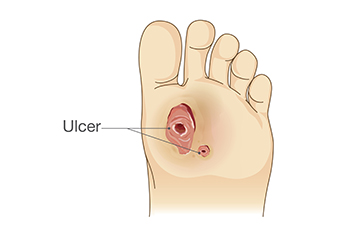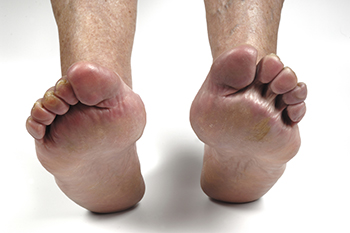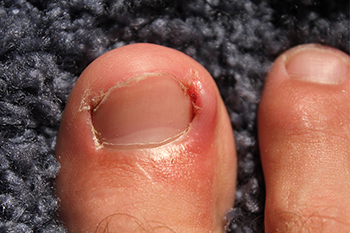
Diabetic foot ulcers are common among those with diabetes, requiring vigilant wound care to prevent complications and promote healing. These ulcers often develop due to reduced blood circulation and nerve damage in the feet, making them slower to heal and more susceptible to infection. The key to managing diabetic foot ulcers lies in meticulous care. This can begin by keeping the wound clean to prevent infections. Regularly change dressings and use prescribed topical antibiotics if necessary. Removing pressure from the affected foot and using special footwear may help to redistribute weight. Monitor blood sugar levels because high glucose levels can impede the healing process. Consulting a podiatrist is essential for proper wound assessment and care. They may recommend advanced wound dressings, debridement, or surgical interventions if the ulcer is severe. If you have diabetes, it is strongly suggested that you are under the care of a podiatrist who can help manage this condition.
Wound care is an important part in dealing with diabetes. If you have diabetes and a foot wound or would like more information about wound care for diabetics, consult with one of our podiatrists from Foot Health Center of Merrimack Valley. Our doctors will assess your condition and provide you with quality foot and ankle treatment.
What Is Wound Care?
Wound care is the practice of taking proper care of a wound. This can range from the smallest to the largest of wounds. While everyone can benefit from proper wound care, it is much more important for diabetics. Diabetics often suffer from poor blood circulation which causes wounds to heal much slower than they would in a non-diabetic.
What Is the Importance of Wound Care?
While it may not seem apparent with small ulcers on the foot, for diabetics, any size ulcer can become infected. Diabetics often also suffer from neuropathy, or nerve loss. This means they might not even feel when they have an ulcer on their foot. If the wound becomes severely infected, amputation may be necessary. Therefore, it is of the upmost importance to properly care for any and all foot wounds.
How to Care for Wounds
The best way to care for foot wounds is to prevent them. For diabetics, this means daily inspections of the feet for any signs of abnormalities or ulcers. It is also recommended to see a podiatrist several times a year for a foot inspection. If you do have an ulcer, run the wound under water to clear dirt from the wound; then apply antibiotic ointment to the wound and cover with a bandage. Bandages should be changed daily and keeping pressure off the wound is smart. It is advised to see a podiatrist, who can keep an eye on it.
If you have any questions, please feel free to contact one of our offices located in North Andover, and Tewksbury, MA . We offer the newest diagnostic and treatment technologies for all your foot care needs.










